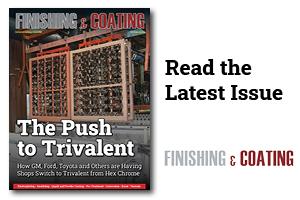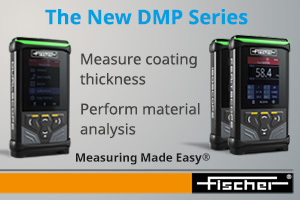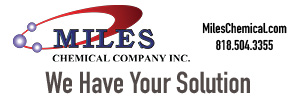Abitl Finishing in Tulsa has a lot in common with players in the nearby Oklahoma Sooner NCAA football program: they are big and fast.
 Rob BartlettThe powder coating operation has what it deems a “Super Size” batch powder coating booth that is 80 feet long and boasts what it says is “Mid-America’s largest batch powder coating oven.”
Rob BartlettThe powder coating operation has what it deems a “Super Size” batch powder coating booth that is 80 feet long and boasts what it says is “Mid-America’s largest batch powder coating oven.”
Forget what they say about Texas to the south: everything is bigger at Abitl Finishing in OK.
For a powder coating operation that has two facilities with over 160,000 square feet of space, they also add to that size attribute with a flair for quickness. They usually turn around parts in 3-5 business days, with an average of about 3.7 days.
Moving Parts Through the Coating Process Quickly
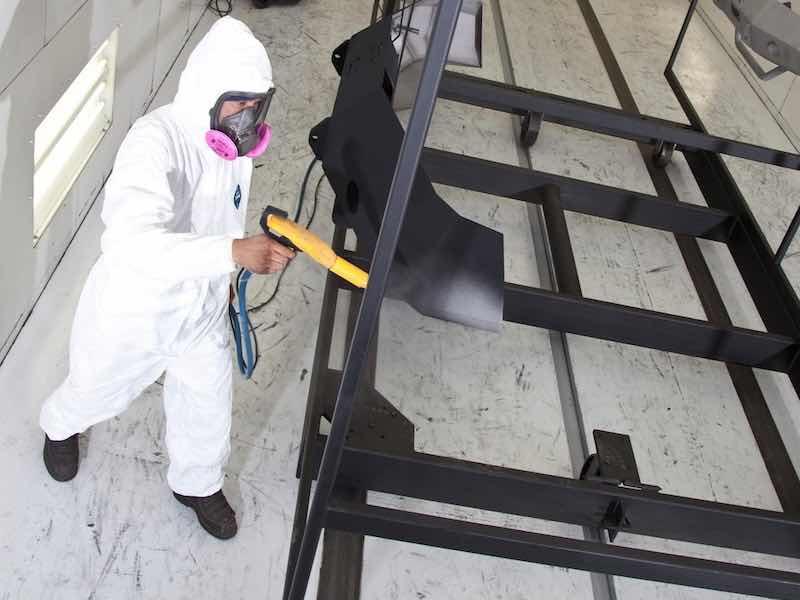 Abitl has an extremely low 0.26% reject rate in 2023.Rob Bartlett, Director of Operations for Abitl Finishing, says customer demand is a major reason they move parts quickly.
Abitl has an extremely low 0.26% reject rate in 2023.Rob Bartlett, Director of Operations for Abitl Finishing, says customer demand is a major reason they move parts quickly.
“Sometimes we get a call from a customer wanting to know when their parts will be done even before the parts even arrive,” he says.
But fast turnaround doesn’t mean a lack of quality. Michelle Payden, the Quality Manager for Abitl at both locations, says the company goal is to be as near perfect as possible while meeting customer demands.
“As an ISO 901:2015 certified shop, we keep quality objectives which include maintaining a less than 1% reject rate,” she says. “We closed out 2023 with a 0.26% reject rate at one facility and 0.14% at the other.”
Bartlett says the secret to having such a quick turnaround with few rejects doesn’t necessarily have to do with how they apply the powder coatings. Instead, it is the way the company runs its operations, working to stay on top of things in order to keep the parts flowing and without interruptions.
“Much has to do with how clean we keep the facility, as well as our preventive maintenance programs,” Bartlett says. “We make sure that we don’t have the breakdowns and that we’ve got parts needed in case a piece of machinery does so we can fix the machines.”
Retaining Experienced Workers Speeds Production
 Michelle PaydenAnother big reason is the experience of the Abitl employees; Bartlett says they have people on staff who have been there since the company's inception.
Michelle PaydenAnother big reason is the experience of the Abitl employees; Bartlett says they have people on staff who have been there since the company's inception.
“It makes a huge difference,” he says of the low turnover rate. Of course, having equipment capable of doing multiple colors and a fast line speed to accomplish that turnaround time for our customers is key, too.”
Abitl Finishing was founded in 2000, and its name comes from the acronym “A Belief in the Lord” that the founders decided to call the company. They have two locations in the Tulsa area:
- Abitl Finishing is a high-volume automated powder coating facility on OK-66. It is an ISOand PCI-certified shop with an extremely low 0.26% reject rate in 2023.
- Abitl Powder Coating is a super-size batch powder coating facility on 66thStreet that has two 80-foot ovens, a 90-foot coating booth, and a blast. There is no chemical pretreatment at this facility. It is also ISO and PCI certified, and the reject rate at the facility for 2023 was 0.14%.
The pretreatment on the automatic mainline — which has a 4-feet by 5-feet winder and a trolley weight of 300 pounds — has a 7-stage wash system with an alkaline wash and a zirconium coating application. The “hot flock” booth applies primer, and Abitl has a pair of E-Rooms that automatically cover parts with a complete and even powder coating.
“A lot of the companies we were targeting had some pretty stringent quality needs. We went after the ISO certifications and then PCI, and we were able to go after large OEM companies with the bigger volume.”
The batch main has a trolley weight of 1,200 pounds trolley capacity. Batch Area 1 is for large or complex configuration parts measuring 12 feet wide by 30 feet long and 9 feet tall. It includes a spray clean/conversion process that removes loose soils and preps the surface to receive a coating. Batch Area 2 is also for large and complex configuration parts and has a trolley weight limit of 2,400 pounds each.
PCI Certification Keeps Team on the Right Path
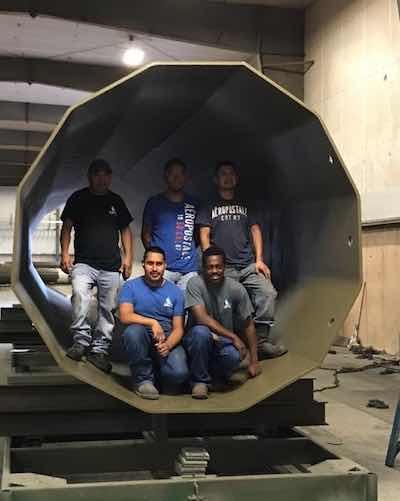 Abitl has what it deems a “Super Size” batch powder coating booth that is 80 feet long and boasts what it says is “Mid-America’s largest batch powder coating oven.”Abitl Finishing also has PCI Certification from the Powder Coating Institute, a strenuous audit process that evaluates custom coaters and OEMs. Those certified coaters can show through audited performance measurements that they have the equipment and processes in place to clean, coat, and cure their parts and products correctly.
Abitl has what it deems a “Super Size” batch powder coating booth that is 80 feet long and boasts what it says is “Mid-America’s largest batch powder coating oven.”Abitl Finishing also has PCI Certification from the Powder Coating Institute, a strenuous audit process that evaluates custom coaters and OEMs. Those certified coaters can show through audited performance measurements that they have the equipment and processes in place to clean, coat, and cure their parts and products correctly.
After a pre-audit telephone consultation, the certification process includes an initial on-site audit, which can take 1-2 days and examines 10 areas of competency. Supporting documentation, such as logs and record-keeping procedures, is required.
Upon passing the on-site certification audit, the certified company is required to complete an annual Certification Maintenance Audit for the next two years, which is a self-audit that verifies that processes and procedures evaluated during the on-site audit have been sustained to the level required for certification. Any changes or updates to systems or processes must be shown through documentation and photographs.
Payden says they sought PCI Certification because they saw it as setting the bar for best practices in the coating industry.
“For us, certification works internally and externally,” she says. “It provides best practices within our organization and bolsters customer confidence in our quality consistency and repeatability.”
Bartlett says having the certifications helps Abitl get larger, higher-volume customer work.
“A lot of the companies we were targeting had some pretty stringent quality needs,” he says. “We went after the ISO certifications and then PCI, and we were able to go after large OEM companies with the bigger volume.”
Documenting the Culture That Was Already Present
 Darren BrasiolaFortunately, Abitl was already practicing many of the quality standards that ISO and PCI required to earn those certifications, so it wasn’t that big of a leap to align with what they needed to do to earn the accreditations.
Darren BrasiolaFortunately, Abitl was already practicing many of the quality standards that ISO and PCI required to earn those certifications, so it wasn’t that big of a leap to align with what they needed to do to earn the accreditations.
“From my standpoint, it was a matter of documenting the culture already here,” Payden says. “We already had preventive maintenance programs in place and many of the other requirements. That quality mindset already existed for us.”
Abitl’s management team had the vision from the beginning that they wanted to be viewed as a top-tier coating operation, Bartlett says and did not want to compete with smaller operations.
“We essentially bought the 747 before we even had passengers,” he says. “We always knew we wanted to go after larger OEM customers, and it took some time and quality efforts over the years to get to that point. We wanted to be the largest coater in the Midwest, and we knew we needed to prove ourselves.”
Abitl did make a name for itself in the Tulsa area rather quickly, and then word began to spread beyond the city limits. The company didn’t spend money on advertising or even have a formidable website until around 2007.
“But I truly am a very blessed Quality Manager because Rob, Brandon, Darren and the entire team have the quality mindset.”
The goal now is to continue that reputation of size, speed, and quality going forward as it builds even more awareness, which has to do with Payden, the Quality Manager. She is in charge of making sure the product meets all customer specifications and the certifications they hold, even as the pressing issues—getting parts prepped and out the door—continue to grow as the business increases.
Keeping Parts Flowing In and Out of Two Facilities
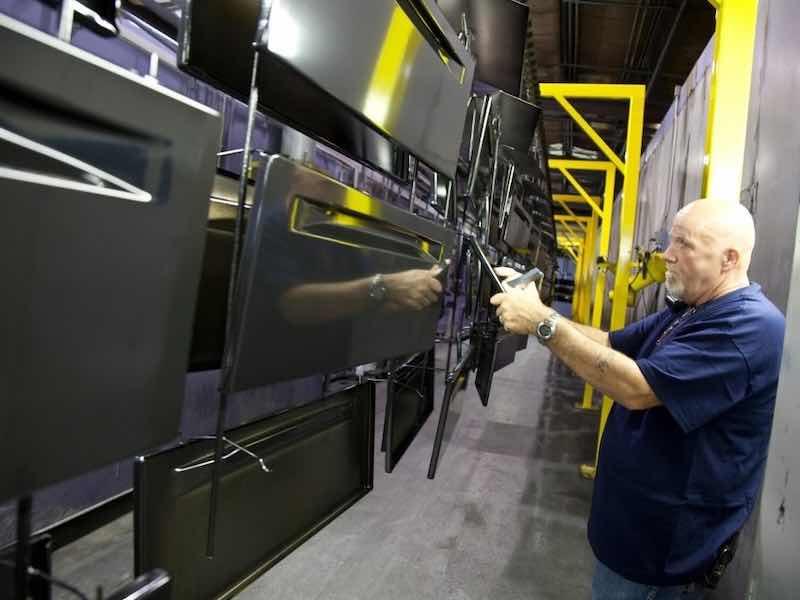 As an ISO 901:2015 certified shop, Abitl keeps quality objectives which include maintaining a less than 1% reject rate.Payden says her main objective each day is to help Bartlett and the other managers — including Darren Brasiola, the Senior V.P. of Operations — keep parts flowing smoothly and in top form between the two facilities.
As an ISO 901:2015 certified shop, Abitl keeps quality objectives which include maintaining a less than 1% reject rate.Payden says her main objective each day is to help Bartlett and the other managers — including Darren Brasiola, the Senior V.P. of Operations — keep parts flowing smoothly and in top form between the two facilities.
“Any day that something doesn’t blow up is a good day,” she laughs. “But I truly am a very blessed Quality Manager because Rob, Brandon, Darren and the entire team have the quality mindset.”
Payden’s experience is heavy on the production side, too. She has an Associate of Science degree from the Tulsa Welding School and field and shop fabrication experience. With over 20 years of experience now on the quality side, Payden certainly has mastered the art of keeping customers happy while also ensuring parts get a top-notch coating.
“The specification is the bible,” she says. We have customers with 10 pages of specifications, and then we have a few customers who say after-speckles on it are fine. The trick is to remain fluid and flexible to meet our customers' needs.”
Bartlett and Payden agree that production and quality have the same goal.
“The goal should always be that the company is progressing and that we are meeting and exceeding our customers' expectations,” Payden says. It should also mean that we're retaining customers, we're getting new customers, and we're making record efforts, and when that occurs, it means that the production and quality teams are working very well together.”
Visit https://abitl.com















